It is often hard to determine what fills the seats in many performing arts genres, with counterintuitive surprises on both the negative and positive side. Count this one as a positive: While Peter Ilyich Tchaikovsky’s Nutcracker was filling the halls everywhere during the holiday season, his lesser-known vocal rather than ballet music scored hits in both DC and New York.

A suite of Tchaikovsky’s much lesser-known songs drew one of the biggest recent audiences at DC’s Russian Chamber Art Society (RCAS), while the Tchaikovsky opera The Queen of Spades packed in near-capacity crowds at the Metropolitan Opera in New York at the end of a decade of repeated troubles for the renowned institution. And would you believe that a Norwegian soprano and a Chinese tenor were largely behind these two big successes?
The soprano, Lise Davidsen, made a splash in the nearly identically named lead role of “Lisa” in The Queen of Spades, while a special find of the RCAS, smooth-voiced Chinese tenor Fanyong Du, headlined their Tribute to Tchaikovsky on the composer’s 180th anniversary. Du actually spent several years training in Odessa, Ukraine, and then continued his work in the U.S. with teachers and coaches including RCAS founder and artistic director Vera Danchenko-Stern. He thus exemplifies the current search for musical experiences and stardom among emerging Chinese artists diving into the Western classical music tradition.
Tchaikovsky actually wrote 103 separate songs, or “romances” as they are generically known in Russian, apart from his operas, ballets, and symphonies. But this particular Russian art form really carries a broader meaning of “romance” than the English word suggests. The idea of a “ballad” probably captures it a little better, and you better believe that some of them are “power ballads,” to borrow a term used in both pop/rock music and American musical theater. Tchaikovsky often produced a stylistic variety of these romances in groups of six by pulling lyrics from Russian writers and poets and occasionally supplying his own.
For example, at the RCAS event, Du sang two songs from Tchaikovsky’s opus 38 suite of six romances that had lyrics from A.K. Tolstoy, who was a different Russian writer than the Leo Tolstoy of War and Peace. One of the songs, “Twas in Early Spring,” has a gently rising melody supporting lyrics that start out as praise of the smell of grass and fresh birch trees, but eventually links that sensation to young love and can be easily interpreted as an older person looking back on earlier times. The piano part performed by Danchenko-Stern sounds like a flowing river that perfectly fit the very mellifluous sound that Du produced for the number.

In the other opus 38 song, “At the Ball,” an initially rollicking piano accompaniment sets a scene at a fancy soiree at which new lovers are spying each other for the first time, but with a more ambiguous result than you might think of from West Side Story’s “Dance at the Gym.” A repeated melodic line up to a high G showed Du’s notable evenness of tone as he delivered conflicted lyrics speaking of the singer’s perception of his possible lover’s “laughter so sad.”
The Russian romances are filled with this kind of bitterness-tinged irony, and the RCAS avoids making them sound silly by keeping all of the actual performances in Russian, with English translations provided in handouts that I think are best left for perusal before or after the songs.
In another song called “Why?” from a different suite of six romances, Du sang above a pulsing piano rhythm of the unexpected sadness of seeing birds flying and a spring rose, and surprisingly asks “Why is the dew hanging like a funeral blanket above the meadows?” The final line of the song answers the riddle by revealing that the singer is not really singing about nature but about people: “Why am I even more sad and more painful day by day? Why, oh tell me sooner, you, have abandoned and forgotten me.”
Du and Danchenko-Stern added an encore of what to Russian opera fans is a familiar work, “Lensky’s Aria” from the Tchaikovsky opera Eugene Onegin, which Washington National Opera performed last season. The Lensky character sings in alternately dramatic and poignant fashion just prior to what the audience fears – correctly – will be his death in a duel. It will be nice to see Du perform the full role of Lensky on local stages sometime soon in his career.
While not as often performed among the Tchaikovsky operas as Eugene Onegin, The Queen of Spades turned out to be a surprise hit in the Metropolitan Opera season largely due to the presence of Davidsen, and also gratifyingly including singers who were featured in WNO’s Onegin. The best news is that Davidsen has a voice that musical theater fans have no reason to fear when they go to the opera. New York critics have credited her with a “bright bell-like top” that never has to be pushed to be heard. That’s a tremendous trick in the vast space of the 3,800-seat Metropolitan Opera, where the company often must resort to more blatant opera voices to sing over the pit orchestra, especially since body mikes are verboten in opera.
In The Queen of Spades, based on a story by Alexander Pushkin, the Lisa character is the granddaughter of an old countess who is known to possess the secret three cards that are guaranteed to win a game of “faro” at the gambling table. Lisa’s love interest, Hermann, turns out to be more interested in her grandmother’s gambling secret than a future forever with Lisa. You can guess which of the three cards that the ghost of the countess claims to tell Hermann to bet is actually incorrect – three, seven, and (ahem) ace – and what the correct card is!
But those are set-ups for several notable performances at the Met, including Igor Golovatenko, who successfully “angered” the WNO audience with his portrayal of the initially haughty Onegin last spring, and winningly had his Metropolitan Opera debut as Hermann’s love rival Prince Yeletsky. This season the Metropolitan Opera also scored surprise hits besides its usual crowds for La Bohème and Carmen in a production of Porgy and Bess (for which the Met has had to add performances, a true rarity) and even an opera about ancient Egypt called Akhnaten starring emerging superstar countertenor Anthony Roth Costanzo, who is coming to DC for a concert appearance at the Phillips Collection on Sunday, March 29.
It seems that personal star power – and simply the name of “Tchaikovsky” beyond the 1812 Overture and his three popular ballets – is ultimately winning out even at times when everything else being shown is about the December holidays. No doubt other classical music-oriented presenters will take note.
Tribute to Tchaikovsky – 180th Anniversary was performed at the Russian Chamber Art Society on Thursday, December 12, 2019 at La Maison Francaise, Embassy of France, 4101 Reservoir Rd. NW, Washington, DC. For the RCAS’s upcoming events, go online.
The Queen of Spades was performed from November 29 to December 21, 2019 by the Metropolitan Opera, Lincoln Center, 30 Lincoln Center Plaza, New York, NY. For the Met’s complete remaining 2019-2020 season, see their season calendar.




